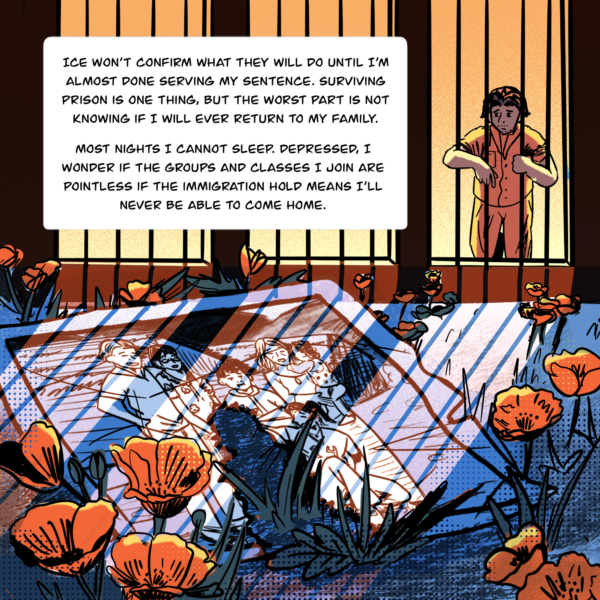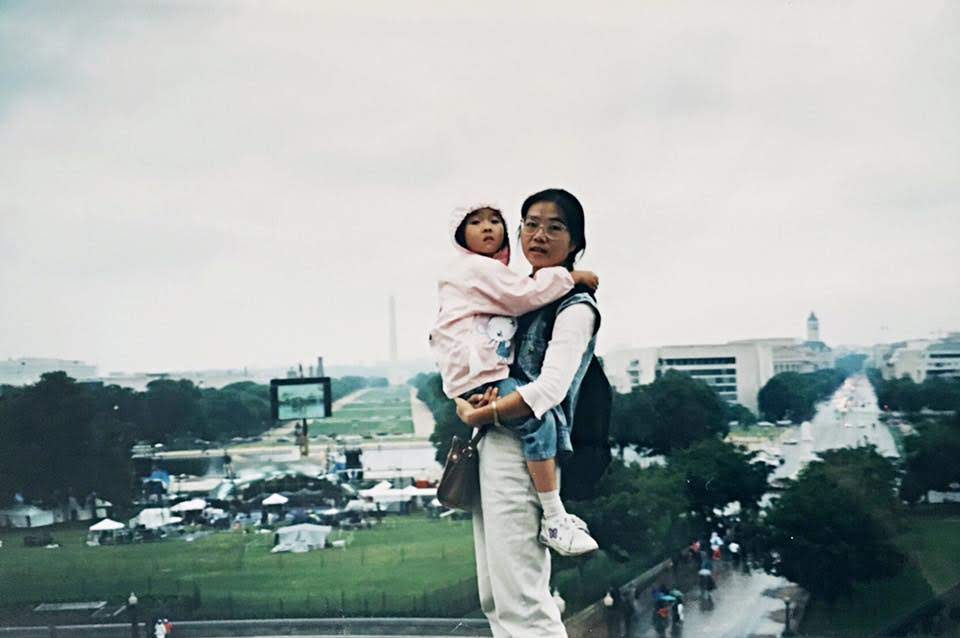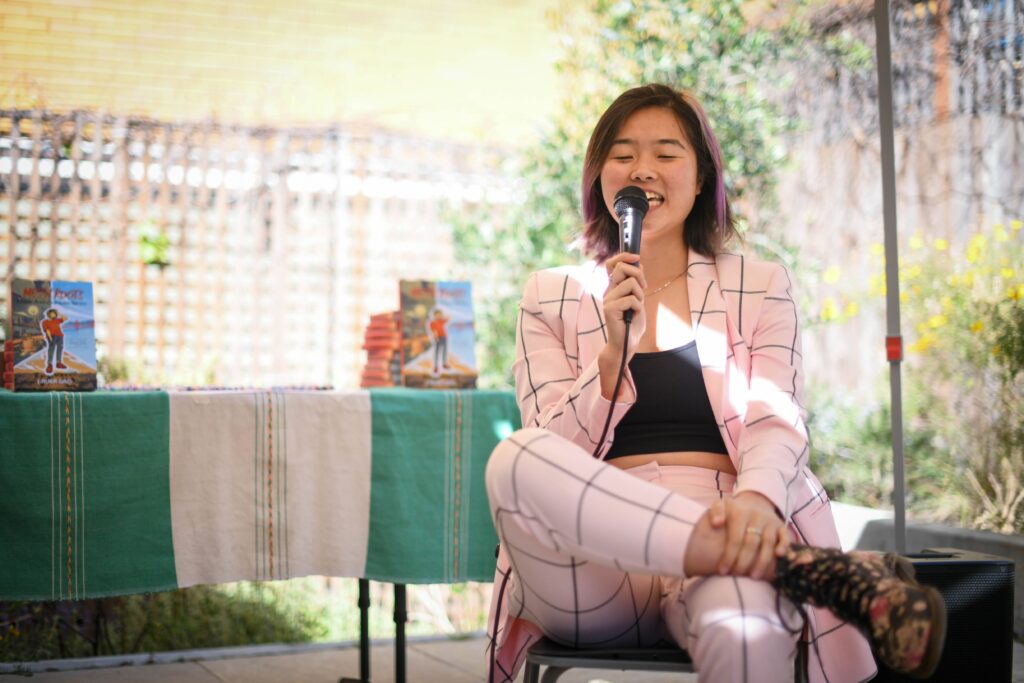Behind closed doors California state prisons voluntarily collude with Immigration and Customs Enforcement (ICE), tearing immigrant families apart. A Chinese American artist brings this unspoken reality to life in a comic called “Broken Stems,” using fictional characters to represent the lived experiences of immigrants.
The Asian Law Caucus teamed up with artist Laura Gao to illustrate how criminal legal systems and immigration systems impact Asian Americans and other immigrant communities. The caucus is a legal and civil rights organization that advocates for low-income, immigrants, Asian American and Pacific Islander communities.
“We make sure people not fluent in English are able to fight back against unlawful and unjust evictions,” Asian Law Caucus Communications Director, Nikita Kumar said. “To helping different workers throughout California fight for the rights, to basic health and safety protection, to get paid fair wages, and to being able to come together and for a union.”
Working with other organizations, the Asian Law Caucus quickly saw how the prison system discriminates against immigrants. So, they wanted to help more people understand what was going on in prisons.
Kumar said, “As a legal organization, I think we are also trying to push ourselves to find ways to share what we are learning throughout legal. investigations in ways that are accessible to people who do not know the law.”
LATEST STORIES
And “Broken Stems” was born.
Lauren Nguyen, a communications associate at the Asian Law Caucus, reached out to Gao and asked if she would be interested in illustrating the comic.
Gao replied, “I knew that this issue was deep to my heart and I wanted to it justice.” So, the two got straight to work.
The team and Gao began setting their vision for the comic. They decided to tell the story through the fictional character Vyseth, a Thai immigrant who lived almost all of his life in California.
“I think that was their decision because they wanted the story to be representative of people of all different backgrounds,” Gao said.
Then, Gao began sketching. The Asian Law Caucus gave her resources to help guide her illustrations, like interviews with incarcerated immigrants and those who have dealt with ICE.
“And then on their side, they started drafting what they thought could be the potential story to tell,” Gao said. “And then when we shared our drafts they then were able to take what they liked from mine and we went back and forth revising for a couple of weeks.”
The comic they created and shared helped to shed light on systems and institutions that Americans might not be familiar with. And through the comic format, the illustrations provide a visual understanding and the text provides just enough information to be able to educate a wide range of viewers, even children.
“I feel like people who are really good at reading art, which a lot of kids are, are able to get all of this nuanced emotion that I put into the art,” Gao said. “That even if they don’t necessarily read the text, or understand it they are able to fully get it.”
Although the comic is brief, it shows viewers how impactful the threat of deportation is to immigrant families and their communities. The images and text depict how the prison system works against immigrants causing many to worry if they will ever be able to return to their families.

In response to the comic, the community was able to have more conversations about the systems and policies. Because of this, the Asian Law Caucus hopes to continue to use this format to educate people on even more community issues.
“It’s a great avenue for people to get their news, in the same way people might want to get their news in a TikTok video,” Gao said. “Sometimes it’s a little bit more digestible.”
“Broken Stems” is just one of the comics created by Gao that focuses on immigrants, or people who are not a part of the dominant culture. Her first work was “The Wuhan I Know” which she wrote during the pandemic, when anti-Asian hate was on the rise.
“I wanted to write a comic that was a love letter to my hometown, Wuhan despite all of the negativity it was getting on the news,” Gao said.
She lived in Wuhan with her grandparents while her parents immigrated to the States for school. Four years later, the family reunited in America, when her parents had saved enough money to move them all.
They hopped around from Louisiana to Texas, where Gao mainly grew up.


When she turned 18, she embarked on a new journey at the University of Pennsylvania studying business.
Post college, she packed up and moved to San Francisco to work for Twitter. But in between all the different people and places, there was one consistent thing in her life: drawing. What began as doodling on Pokemon cards, became a form of self-expression.
Whenever life was stressful, Gao’s economics teacher and mentor would remind her to go back to her roots. She would ask “What is the one thing you always enjoy doing whenever you have a completely free day?” Gao said, “That one thing was always making art.”
When “The Wuhan I Know” went viral, publishers became interested and wanted to hear more.
“The moment I got the opportunity, I wanted to lean all in,” she said.
Gao left her job at Twitter and began writing and drawing full-time. Eventually, her webcomic turned into the graphic novel memoir “Messy Roots.”




In her memoir, she shares her coming-of-age experience with racism and homophobia. Through the text and illustrations Gao reveals that although the journey was difficult, she is now fully able to embrace her identity.
Gao is currently working on her second graphic novel and hopes to create more stories about Asian American history and queer history.
“With Broken Stems” and all of my future books, I hope it inspires someone to have that conversation that they were before afraid to have,” Gao said. “To do something that they previously did not have the support to do.”
AsAmNews is published by the non-profit, Asian American Media Inc. Follow us on Facebook, X, Instagram, TikTok and YouTube. Please consider making a tax-deductible donation to support our efforts to produce diverse content about the AAPI communities. We are supported in part by funding provided by the State of California, administered by the California State Library in partnership with the California Department of Social Services and the California Commission on Asian and Pacific Islander American Affairs as part of the Stop the Hate program. To report a hate incident or hate crime and get support, go to CA vs Hate.
Related
This post was originally published on this site be sure to check out more of their content.








